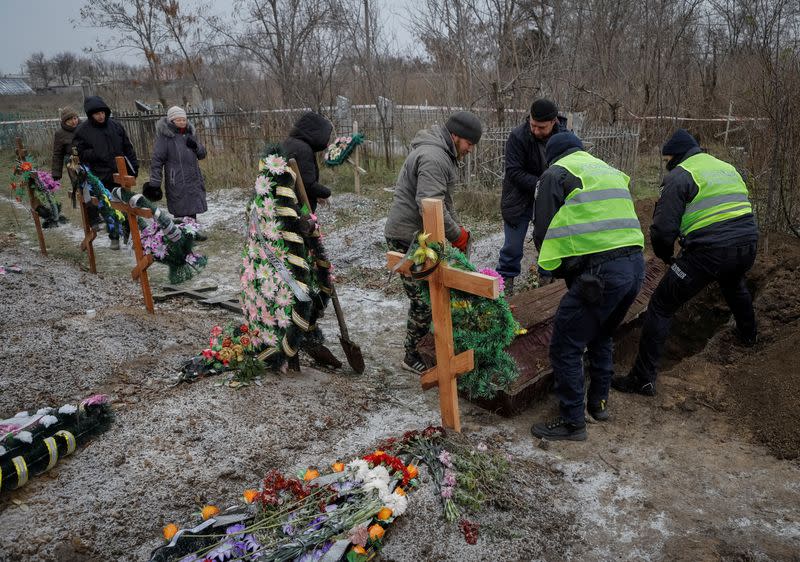Ukrainian officials search for evidence of Russian war crimes
By Anthony Deutsch
VYSOKOPILLIA (Reuters) - Tamila Pehyda, a retired school teacher, looked on in tears as gravediggers exhumed her husband's remains and a forensic pathologist examined them to establish the cause of death.
As suspected, Serhiy, who was 70 when he died in June in the southern Ukrainian village of Vysokopillia, was killed by shrapnel during heavy artillery shelling as Ukraine sought to recapture territory from the Russians.
The grisly process is being organised by Ukrainian authorities who are gathering evidence of how people died and whether potential war crimes have been committed by Russian forces fighting in Ukraine.
They, and many of the relatives involved, want to hold Russia accountable for what has happened since its full-scale invasion of Ukraine on Feb. 24.
"Of course, they must be responsible for everything, both morally and physically," Tamila told Reuters on Monday as she stood by her late husband's temporary grave. How much grief they have brought here. To children, to grandchildren."
Like many Ukrainians from villages and towns that have been largely flattened in artillery exchanges and close combat, she fled Vysokopillia when she could. Serhiy decided to stay behind.
So did Tetiana Muzychko, 58, deputy head of the local municipality who ran to Serhiy's house when she heard loud blasts. She said he was conscious when she found him, but the injuries to his legs and lower body were so severe that he died.
"The wounds were incompatible with life," she said as she comforted Tamila on a cold, sunless day.
Snow powdered hastily dug graves where Muzychko said more than 20 villagers killed in the fighting were likely buried.
"They (Russian forces) said: 'Why are you shooting at us? We came to free you.' I asked them: 'Free us from what? From the fact that we live well, better than you?'"
She said she hoped Russia would be held accountable at the highest level for alleged abuses during the war, including by the International Criminal Court in the Hague.
"They must answer for everything they have done."
Moscow has previously denied allegations it has targeted civilians, and has rejected accusations of war crimes. Tens of thousands of people - both combatants and civilians - have been killed in the fighting.
Russia sent troops into Ukraine in what it called a "special operation" to degrade its southern neighbour's military capabilities and root out people it called dangerous nationalists. Kyiv rejects this justification as a sham.
Tamila was to bury her husband in a permanent grave. According to tradition, she placed Serhiy's hat, glasses and comb in the coffin before his remains were interred.
UNDER FIRE
Ruslan Gavrylov, head of the district prosecutor's office in the nearby city of Beryslav, oversaw the exhumation and examination. Because the cause of death was clear, he said an autopsy would not be required.
He and others investigating potential crimes face the unusual and sometimes dangerous task of doing so while the conflict is raging.
Last week, prosecutor Oleg Palagniuk was taking pictures of damage from an overnight rocket attack on a residential apartment block in the city of Kherson when a salvo of rockets from across the Dnipro river thudded into a nearby neighborhood.
He instinctively put on his helmet, but there was nowhere to hide and so he kept on working.
Palagniuk's work has intensified since Russian forces retreated from Kherson to the eastern bank of the Dnipro River last month. After withdrawing in one of the biggest reversals of the war so far, Russian forces have been shelling Kherson.
"The investigative team arrives, records everything and quickly leaves the scene as there is a risk of repeated shelling," he told Reuters.
"After yesterday's shelling, half of the city again has no electricity, water and communication. It is really very difficult. But we have to work."
In the time since the city was liberated, local prosecutors have recorded 1,500 suspected crimes in Kherson city, he added. That is too many for him and his team to look into properly.
Multiple war crimes investigations are ongoing in Ukraine against alleged perpetrators in the conflict dating as far back as Russia's illegal annexation of Crimea in 2014.
Overwhelmed local judicial authorities are expected to pass along cases involving high-level perpetrators, mass atrocities and widespread violations of humanitarian law to the world's permanent war crimes judiciary, the ICC.
Which specific cases will ultimately go to The Hague will be determined by Ukraine's prosecutor general, Andriy Kostin, with the assistance of a team of international humanitarian law experts working alongside prosecutors such as Palagniuk.
Russia has accused Ukrainian forces of carrying out abuses of their own.
More than 50,000 incidents of international crimes have been reported by Ukraine's prosecutor general since Russia's full-scale invasion. Hundreds of cases of war crimes, genocide and crimes of aggression are being pursued by Ukrainian authorities.
(Writing by by Mike Collett-White; Editing by Mike Collett-White and Angus MacSwan)

 Yahoo Finance
Yahoo Finance 


